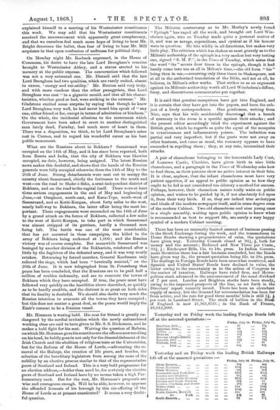On Monday night Mr. Roebuck expressed, in the House of
'Commons, his desire to have the late Lord Brougham's remains brought to Westminster Abbey, and a statue erected to his -memory at the public expense. The conversation which followed was not a very animated one. Mr. Disraeli said that the late Lord Brougham had two qualities, which are rarely united, almost in excess, energy and ver:atility.' Mr. Buxton said very truly, -and with more candour than the other panegyrists, that Lord Brougham was cast "in a gigantic mould, and that all his charac- teristics, whether good or bad, were striking in the extreme." Mr. .Gladstone excited some surprise by saying that though he knew Lord Brougham very well, he had never heard him speak of "any one, either friend or foe, except in terms of admiration or kindness." -On the whole, the incidental allusions to the monument which -Government have been asked to erect to another distinguished man lately dead, Faraday, had much more of heart in them. -There was a disposition, we think, to let Lord Brougham's ashes -rest in Cannes, and to regard his wonderful career as his best public monument.






























 Previous page
Previous page